If you have pigs and a few extra bell peppers lying around, you might wonder can pigs eat bell peppers? The good news is that pigs can eat bell peppers! These colorful veggies are not only safe for pigs, but they’re also packed with vitamins and nutrients that can be a healthy addition to their diet.
However, like with any treat, it’s important to feed them in moderation. Let’s take a closer look at how bell peppers can fit into a pig’s diet and some tips on how to serve them.
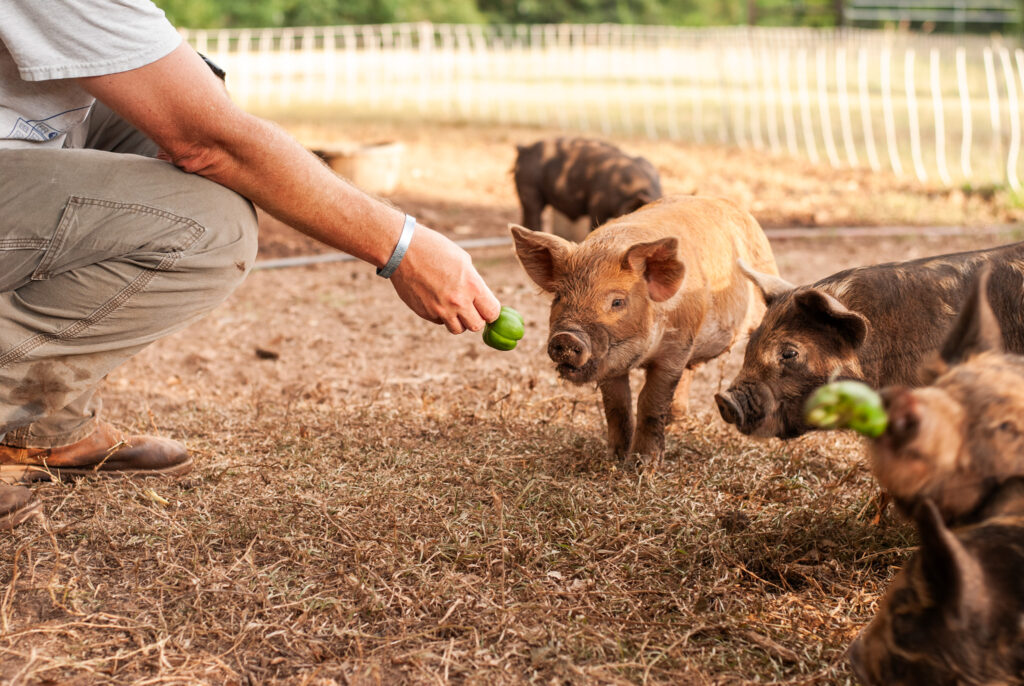
Owning pigs can be a bit tricky, especially when it comes to feeding them. While it might seem like pigs can eat anything and act as the garbage disposal of the farm, that’s not really true. Pigs do enjoy a variety of chicken scraps, but it’s super important to monitor what they eat. Their diet needs to be balanced to avoid health issues.
Pigs love fresh vegetables, and feeding them things like green peppers can add a variety of nutrients to their meals. Leftover bell peppers are actually a nutritious treat for pigs.
Not only are they safe, but they also help support their digestive system and overall health. Including healthy foods like these in their diet is a great way to make sure your pigs stay happy and healthy.
Other Pig Articles You’ll Love!
- Best Pig Breeds for the Farm
- How To Raise Pigs On Pasture
- Easy and Best Electric Fencing For Pigs
- Raising Pigs and Chickens Together
- Raising Pigs In Winter
What Type of Peppers are Good for Pigs
If you’re feeding bell peppers to pigs, it helps to know which ones are best. All bell peppers are part of the capsicum family, but they’re not all the same.
Green bell peppers tend to have less sugar than red, orange, and yellow bell peppers, making them a better option for pigs. That doesn’t mean pigs won’t enjoy the sweeter peppers, though!
Red bell peppers, while higher in sugar, also have more vitamins A and C, so they still offer good nutritional value. Green bell peppers are just peppers that are harvested early before the sugars have fully developed.
Whether you give your pigs green or other sweet peppers, these colorful treats are a tasty way to boost their diet!
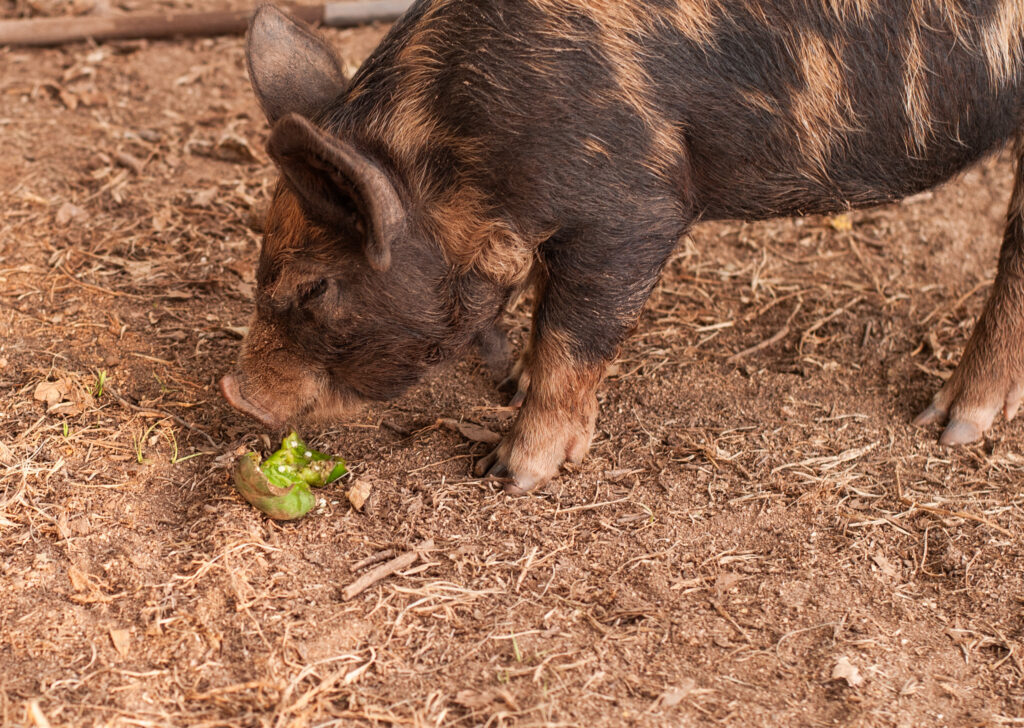
Why Is Bell Pepper Beneficial for Pigs?
Sweet bell peppers are a great addition to a pig’s diet because they’re packed with essential nutrients, especially vitamin C. This vitamin can help boost their immune system, making it easier for pigs to fight off illness and infection.
It’s also a good idea to include bell peppers in a pigs diet because vitamin C helps prevent anemia and improves iron absorption, which is important for overall health. Plus, bell peppers contain vitamin B6, which supports the production of red blood cells.
Including bell peppers as a food item in their balanced diet is a simple way to keep your pigs healthy and thriving on their own vitamin C!
Pigs can eat the entire bell pepper, making it a convenient and healthy snack for them. All parts of the sweet bell pepper, including the seeds and the pith, are safe and nutritious for pigs to munch on.
The seeds of a bell pepper are a great source of fiber, which is beneficial for their digestion. So, whether it’s the juicy flesh, the pith, or the bell pepper seeds, pigs can enjoy the whole pepper as part of a balanced diet. It’s an easy way to give them a nutritious treat without any waste.
Why Is There Concern Around Feeding Pigs Bell Peppers?
Peppers are members of the nightshade family, which are known for containing toxins. While this is a concern, the bell pepper doesn’t contain enough toxins to harm your pigs.
Even still, you should feed your pigs bell peppers in moderation. Too much can upset their stomaches or may have adverse effects.
Other vegetables in the nightshade family are potatoes, tomatoes, and eggplant.
Are Other Types of Peppers Safe for Pigs?
Pigs can eat other types of peppers too, and they don’t mind spicy foods.
Peppers contain capsaicin, which offers a lot of nutritional benefits. Capsaicin can help reduce the chance of blood clots by lowering the amount of lipids that build up in the arteries, which is important since pigs on a farm usually eat a high-fat and protein diet to gain weight. Adding peppers to their meals can help keep their vascular system healthy.
Pigs are also known to have joint problems, and the capsaicin in peppers can help reduce joint pain. All peppers, not just hot ones, contain capsaicin, so they’re a great way to support your pigs’ immune system and overall health without causing digestive problems.
Including peppers in their diet can be a tasty and beneficial way to meet their nutritional needs.
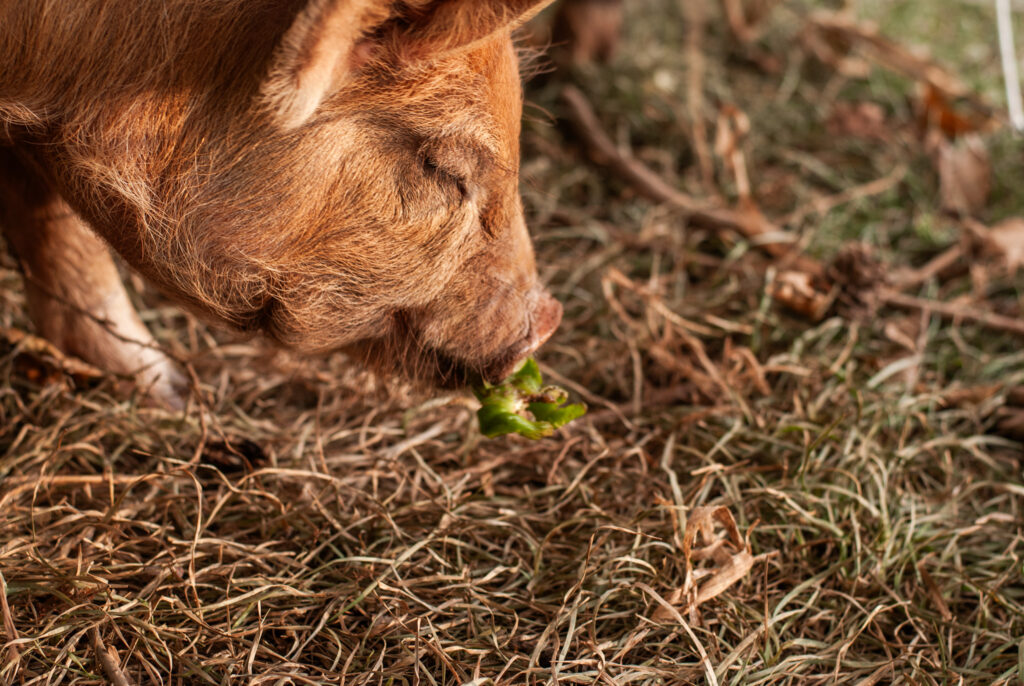
What Types of Vegetables Aren’t Safe for Pigs?
While pigs can eat a wide variety of vegetables, some are unsafe and should be avoided. Vegetables like parsley, parsnips, and celery contain furocoumarins, which can make pigs more susceptible to sunburns.
Onions are another no-go since they can cause digestive problems in pigs.
Root vegetables like sweet potatoes are usually fine, but some, like raw potatoes and green tomatoes, should be avoided because of their potential risks. If you cook the potatoes first, they’re totally fine and probably easier for pigs to eat.
Be cautious with raw eggs too. While an occasional raw egg is okay, they shouldn’t be fed in large quantities. For more on that, check out my previous post on the safety of pigs eating raw eggs. And remember, pigs should never eat avocados or their pits, as these can be toxic.
When feeding them treats, stick to safe options in small amounts and small pieces to avoid a choking hazard and keep their daily diet balanced. If you’re curious about what else pigs can eat, be sure to check out my previous post on that too!
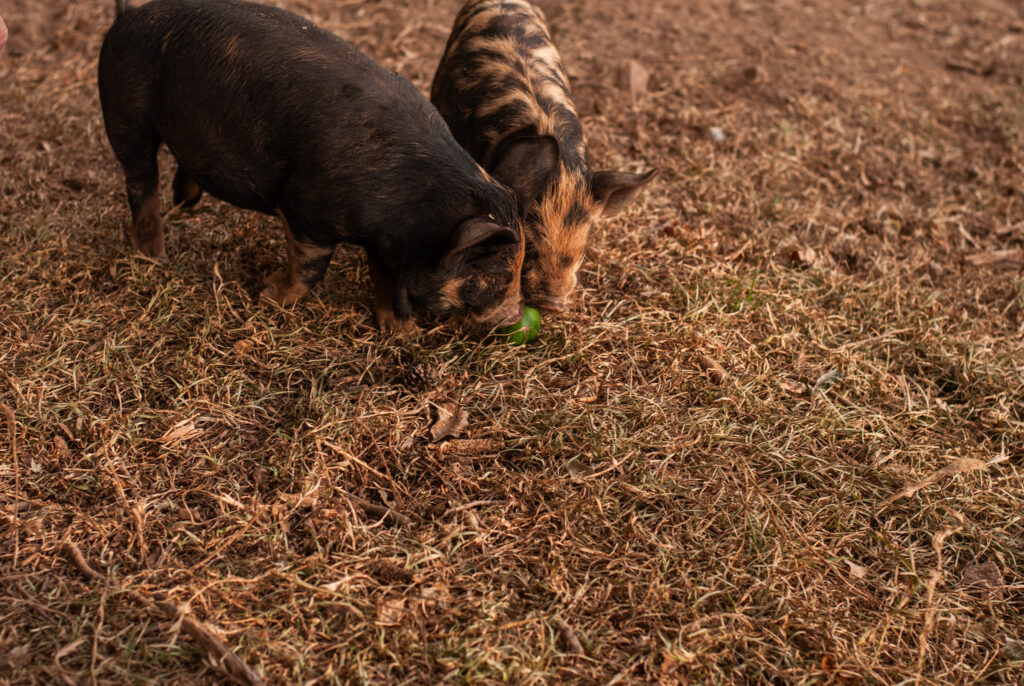
Common Pig Diet Myths
There are a lot of common myths about what pigs can and can’t eat, and it’s important to know the truth so you can feed them the right foods. Let’s clear up a few of these myths:
Myth #1: Pigs don’t eat grass.
Pigs will actually eat grass, along with grubs, roots, and other minerals if they’re allowed on pasture or living in the wild. While grass isn’t their main food source, some breeds do graze more than others. If you’re curious about raising pigs on pasture, be sure to check out my post on that.
Myth #2: Pigs can eat anything.
It’s true that pigs enjoy a variety of foods, but it’s best not to feed them junk food, moldy or rotten food, or anything high in sugar or salt. Instead, pigs thrive on a diet of fresh fruits (except cherry pits) and vegetables, which are packed with dietary fiber. Feeding them the best options on a daily basis is key to keeping them healthy.
Myth #3: Pigs can eat raw eggs.
While raw eggs might seem like an easy snack, the egg whites contain a protein called avidin, which can prevent biotin from doing its job. If pigs eat too many raw eggs, they can end up with a biotin deficiency. It’s okay as an occasional treat, but not in large quantities.
Myth #4: Pigs can eat raw meat.
Raw meat won’t necessarily hurt pigs right away, but it can carry parasites or bacteria that could be harmful. Cooking the meat first is a safer option if you’re going to feed it to your pigs.
Myth #5: Pigs can eat chocolate.
While chocolate might be one of your favorite treats, it’s definitely not a good idea for pigs. Chocolate contains substances that aren’t good for pigs and can lead to health problems, so it’s best to keep it out of their diet entirely.
Feeding pigs the right foods in small quantities and focusing on fresh fruits and vegetables is the way to go. By knowing what’s safe and what’s not, you can make sure your pigs are eating the best options on a daily basis and staying healthy!
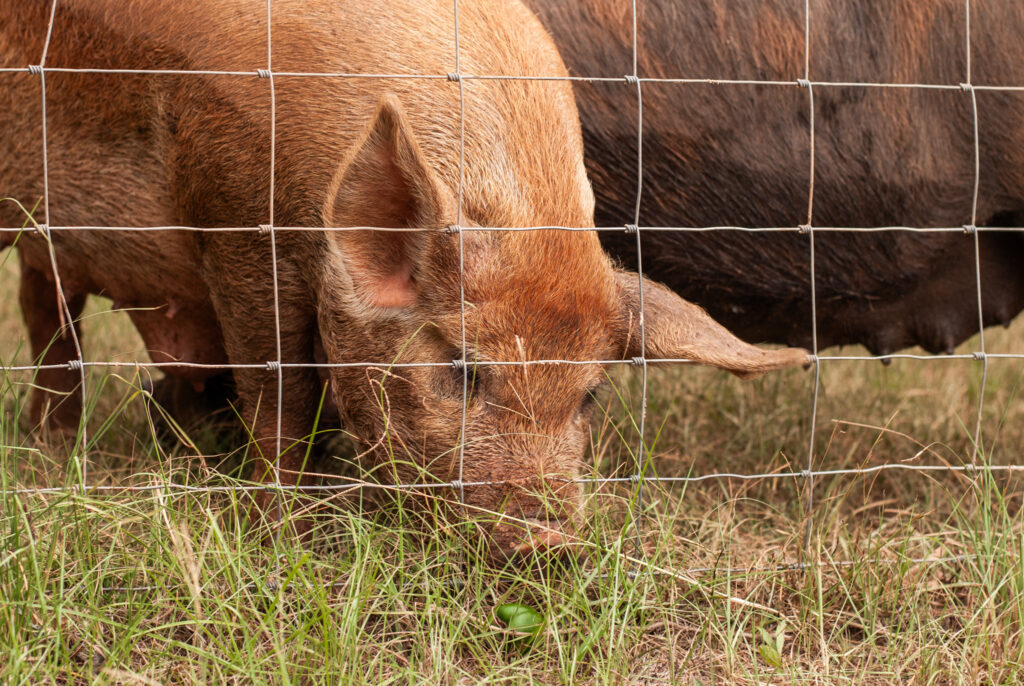
Pigs eating bell peppers FAQs
Can pigs eat bell peppers every day?
While bell peppers are safe for pigs, they should be considered an occasional treat rather than a daily food. Pigs need a balanced diet with a variety of foods to stay healthy.
Are red peppers and yellow peppers okay for pigs?
Yes, red and yellow peppers are safe for pigs. They can enjoy these colorful veggies, which provide different vitamins and nutrients, though they have a bit more sugar than green peppers.
What’s a pig’s favorite food when it comes to vegetables?
Pigs have individual tastes, but many enjoy bell peppers, carrots, and leafy greens. It’s a good idea to mix things up and see what your pigs like best!
Can pigs get enough animal protein from their diet?
Yes, but it’s important to balance their diet with plant-based foods like vegetables and grains. Animal protein is fine in moderation, but too much can lead to health issues.
Should I remove the seeds before feeding bell peppers to pigs?
No need to remove the seeds! The seeds of bell peppers are safe and can even be a good source of fiber for pigs.
Final Thoughts “Can pigs eat bell peppers?”
In conclusion, pigs can definitely eat bell peppers, and they make a healthy and tasty treat for your pigs. Whether it’s green, red, or yellow peppers, your pigs can enjoy all parts of the pepper, including the seeds.
Just remember to feed them in moderation as part of a balanced diet, alongside other fresh fruits, vegetables, and the right proteins. While there are some myths about what pigs can and can’t eat, it’s important to stick to safe, nutritious foods and avoid harmful ones like raw meat, chocolate, and onions. By giving your pigs the right foods, you’ll help keep them happy and healthy!
If you enjoyed this article on pigs, please share it!
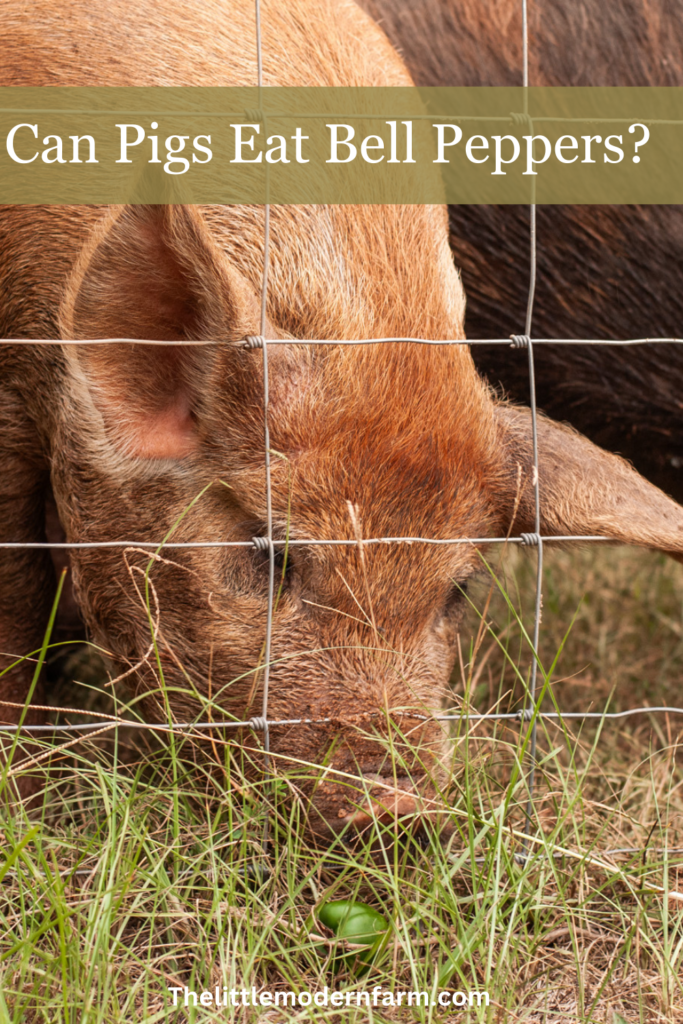
More from the farm
Are pigs easy to take care of? Well, it depends! Whether you’re thinking about raising pigs on a farm or keeping one as a pet, there’s a lot to know. Pigs can be fun and friendly, but they also need plenty of space, food, and care.
Different breeds have different temperaments, so some might be easier to handle than others. We’ll look at what it takes to care for pigs, including how much space they need, the cost of feeding them, keeping them healthy, and the daily chores involved. Let’s dive in and see if pigs are the right fit for you!
“I pray that your love will keep growing more and more, together with true knowledge and perfect judgement, so that you will be able to choose what is best.” Philippians 1:9-10
Leave a Reply